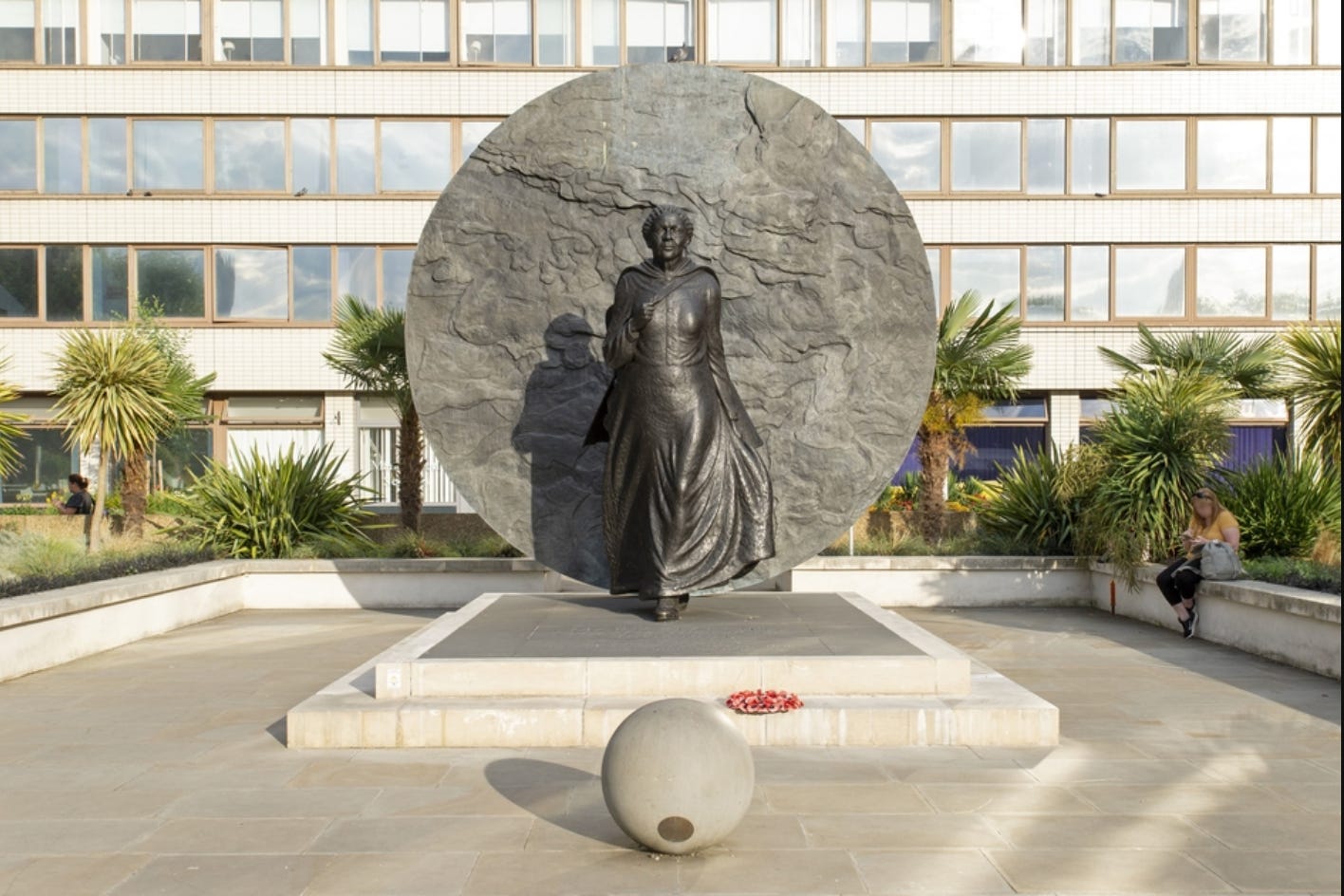Mary Seacole, by Martin Jennings
Dear Reader,
Stress is a Necessary Part of Life
I’ve dropped off the radar the last two weeks, as I was preparing for my final exams in Yoga Therapy. Now, there is “just” a 7,000 essay (on the topic of Sacroilliac Dysfunction and Hypermobility) and the supervised case studies to do. Although at the beginning of March, I’ll make the transition to being a trainee yoga therapist, with the full qualification coming in September 2024.
So, I’ve had my fair share of stress in the last few weeks and I think you’ll agree, there’s a lot to be stressed out about these days. Things appear dire on many levels, environmentally, geo-politically, financially and in our communities. All but the extremely wealthy are affected personally. Now, more than ever, we are called to take care of ourselves, so we may support people in our circles and further afield, in any ways that we feel able to.
Stress is an essential and inevitable part of our journey as it requires us to build resilience and grow in our wisdom. These times may be best viewed as a crash course on spiritual growth. Indeed, the contrast of what we are facing, with how we would like things to be, can be a catalyst for personal, societal and even global change. Another aspect of stress is that it calls us into community. “A problem shared is a problem halved” so the saying goes, if we work in larger groups we can have greater effects.
A Problem Shared
A shift in how we relate to each other in community is also needed. If you’d like to delve into this topic more deeply, I highly recommend the book “Restoring the Kinship Worldview: Indigenous Voices Introduce 28 Precepts For Rebalancing Life On Planet Earth” by Four Arrows and Darcia Narvaez. Here is an interview with them, if you’d like a taster of the book. As the book so beautifully illustrates, reconnecting with the older ways of living in community brings with it many blessings. The modern way of life can be isolating, and lack a sense of connection, warmth and care. Rebuilding community is one way we can improve the quality of our lives as other systems we used to rely upon go through their stages of breakdown.
How Samskara Works
Yoga offers us a huge body of ancient wisdom, to enable us to take care of ourselves, in order to take care of others. It is helpful to learn about samskara to support us in working through the effects that stress has had on our being. This Sanskrit term describes the habits and patterns that we accumulate from our previous lives, through to the whole of our present one. Some of these patterns are held in our DNA (whether from karmic impressions or “chance”); picked up from our caregivers when we’re young; or learned from our teachers or peers. We, of course, develop many habits later on in life, in an effort to adapt to the circumstances we find ourselves in.
Negative Samskara
Often the most unconscious, yet deeply held patterns are instilled in us due to trauma responses to the small and large shocks, harms, disappointments and losses that life brings our way. Our brain and nervous system encode our experiences and responses to stressful events more deeply than other, more mundane or pleasant, events. Even if we don’t remember the event at all, our body and nervous system do. This strategy enables us to mount a timely response to any future similar situation (even if we don’t consciously remember the initial one). Unfortunately, this neurobiological strategy (called long-term potentiation) means that our collection of negative samskara can be a powerful, often unexamined or unconscious, part of us that has huge effects on our whole being.
Positive Samskara
Whereas samskara has come to denote negative habits in modern yogic approaches, the ancient Hindu literature focuses more on positive samskara.
In the Nyaya school of Hinduism, not all samskara are psychological. Rites of passage, other actions, studies, diligent preparation and inner resolutions trigger impressions or dispositions in the psyche of an individual… these influence how the individual acts, perceives self and the manner in which (they) respond to or accept their karmic circumstances and the future.
From Wikipedia
This is a practical understanding that taking intentional action can create a beneficial effect on the whole of our psyche. These actions include: service to others (karma yoga); study of ourselves (svadhyaya); and the “inner resolutions” (sankalpa) that we commit to. Indeed these intentional positive actions can include our yoga practice as a whole. Yoga may be viewed as a complete system of philosophy and practice that supports us to establish positive habits of mind, body and breath. These tools enable us to quell the strength of the negative samskara. Which is important, as it is these negative samskara that perpetuate the problems that we currently face.
Consciousness Enables Change
As mentioned previously, once a samskara is laid down within our panchmayakosha (layers of our being) we are more prone to re-activate it, when faced with similar conditions. This can work in our favour or not, depending on whether the habit is supportive, whether it is a habit that we have outgrown, or whether it is a habit that is re-enacting harm at some level of our being. Samskara can be conscious, barely conscious or very unconscious.
The degree of consciousness we have around the habit is the degree to which we can change it. We don’t necessarily need to know the reason why we created the habit, although we might explore this with our loved ones or a talking therapist. In yoga therapy, we focus on the present and the practical changes we can make that work best for us. If we have awareness (vidya); are willing to practice regularly (abhyasa) and hold a vision of what we are moving towards within ourselves (darshana) we have the the key components for creating change in our samskara.
Creating Holistic Change
Yoga is a practice that supports more conscious awareness of what is happening within our layers of being. This development of conscious awareness empowers us to make changes within our body, breath, thoughts, belief systems and spirit. Change can start at any level, and this is individual to each person. Gentle enquiry with a yoga therapist supports a greater understanding of which kosha to work with first, which subtly initiates the process of positive change within the whole. For instance, by working on your posture (annamaykosha) or breath pattern (pranamayakosha), you’ll be gently teasing out and relaxing the holding patterns in your other kosha - mind (manomayakosha), belief systems (vijnanmayakosha) and capacity for loving connection, peace and bliss (anandamayakosha). You might not even feel this happening, but after some time it may become apparent to you and those around you.
This is essentially how yoga therapy works. With the guidance of a Yoga Therapist, we can embark on the process of creating meaningful change in the layers of our being. And by doing so we can create changes in our relationships, in our communities and even on a global level. To explain how this works we’ll look more deeply into samskara and how it relates to the kosha in the next article.
This upcoming week is the last week of the normal teaching schedule before the holiday period starts. It would be lovely to see you in class!
With love and good wishes,
Julia xxx
Last-minute Christmas Present Idea!
One-Hour Private Yoga Session In-Person - £75.00
One-Hour Private Yoga Session on Zoom - £60.00
Just click on the links above to purchase a voucher under your name.
I will send you a voucher via email like the one below, to print out or you can make your own…
Simply ask the lucky recipient to email me, mentioning your name
then we can organise a time for the session.












How Life Shapes Us